 | | Rod Stewart & Santana Perform Live In Las Vegas |
|
 The new annual edition of our journal of discussion and analysis is now out. More than 170 pages, it includes 14 articles on strategy austerity, organizing, and the right. Cost is $10 plus shipping. Or get one by becoming a sustainer. Click the title to buy it directly. The new annual edition of our journal of discussion and analysis is now out. More than 170 pages, it includes 14 articles on strategy austerity, organizing, and the right. Cost is $10 plus shipping. Or get one by becoming a sustainer. Click the title to buy it directly.
|
GritTV on 'Jackson Rising'
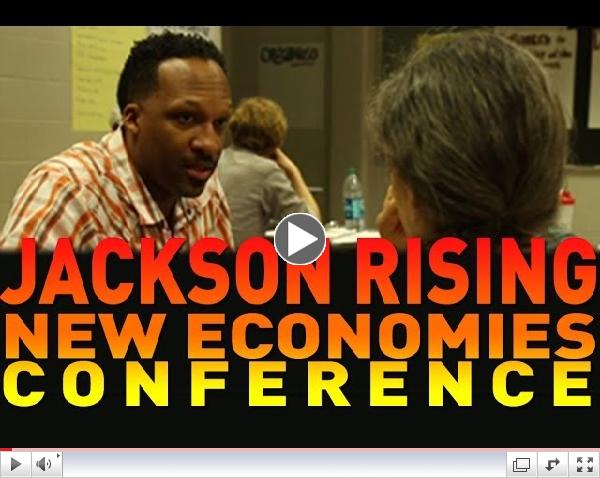 | |
Creating the Mondragon of the South (includes short interview with CCDSer Carl Davidson)
|
|
 | |
Journal of the Black Left Unity Network
|
|

New CCDS Book Reporting on Vietnam
|
|
Radical Jesus:
A Graphic History of Faith 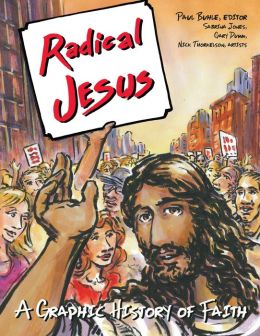 By Paul BuhleHerald Press By Paul BuhleHerald Press
|

Want to Know what CCDS has
been doing...Check it Out!
|
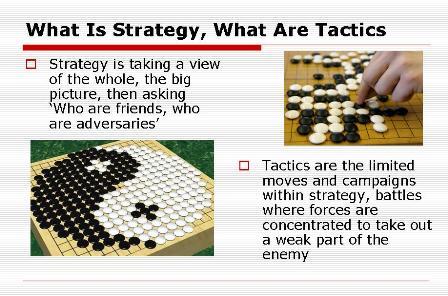 Keep On Keepin' On Keep On Keepin' OnHating the 'Middle Class,' Why Socialists Run in Elections, Strategy and Tactics Slide Slow, Class and Privilege, the Green New Deal ...and other Short Posts on Tumblr by Carl Davidson
|

Edited by Carl Davidson Revolutionary Youth the the New Working Class: The Praxis Papers, the Port Authority Statement, the RYM Documents and other Lost Writings of SDS
Changemaker, 273pp, $22.50
For the full contents, click the link and view 'Preview' under the cover graphic.
|
|
By Randy Shannon, CCDS

"Everyone has the right to work, to free of employment, to just and favorable conditions of work and to protection against unemployment."
- United Nations Universal Declaration of Human Rights, December 10, 1948
I. Introduction
The "Great Recession" that began in 2007 has caused the greatest percent of job losses since the Great Depression of 1929. This crisis is the end of an era of unrestrained 'neo-liberal' capitalism that became public policy during the Reagan administration. The crisis marks a new level of instability with the growth of a global financial elite that targeted US workers and our trade unions after World War II.
|
|
Order Our
Full Employment Booklets
 |
...In a new and updated 2nd Edition
Capitalism may well collapse under its own excesses, but what would one propose to replace it? Margaret Thatcher's mantra was TINA...There Is No Alternative. David Schweickart's vision of "Economic Democracy" proposes a serious alternative. Even more fundamentally, it opens the door to thinking about alternatives. His may or may not turn out to be the definitive "successor system," but he is a leader in breaking out of the box. |
 by Paul KrehbielAutumn Leaf Press, $25.64
by Paul KrehbielAutumn Leaf Press, $25.64 | | Shades of Justice Video: Bringing Down a President, Ending a War |
|
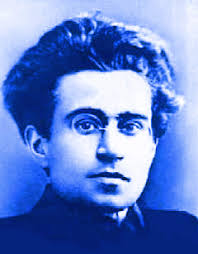 By Giuseppe Fiori
Verso, 30 pages
|

Essays on Mondragon, Marx, Gramsci
and the Green and Solidarity Economies |
Solidarity Economy:What It's All About

Edited by Jenna Allard, Carl Davidson and Julie Matthaei
Buy it here...
|

- Foreword by Susan Brownmiller
- Preface by Ken Wachsberger
$37.50 + $6 shipping
|
|
Discussion Documents for a Militant Movement

By Don Hamerquist
|
|
|
|
An Invitation to CCDSers and Friends...
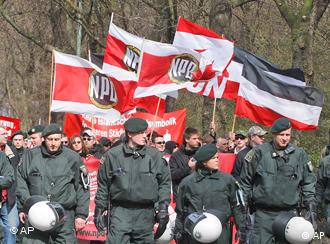 Far Right Surges Far Right Surges
in Europe, Gets
Weird in USA
We're the Committees of Correspondence for Democracy and Socialism...Do you have friends who should see this? Pass it on...Do you have a blog of your own? Others you love to read every day? Well, this is a place where you can share access to them with the rest of your comrades. Just pick your greatest hits for the week and send them to us at carld717@gmail.com! Most of all, it's urgent that you oppose war on Iran, defend voter rights, plan for 2014 races now, oppose austerity, support the 'Moral Mondays' in North Carolina, the Congressional Progressive Caucus' 'Back to Work Budget'! We're doing more than ever, and have big plans. So pay your dues, make a donation and become a sustainer. Do it Now! Check the link at the bottom... |
How a 'New Secessionist' Movement Threatens to Worsen School Segregation and Widen Inequalities

By Susan Eaton
The Nation
May 20, 2014 - A new secessionist movement, anchored in the South, provides yet another reminder that "separate" still means "unequal" when it comes to the racial dynamics of the nation's public schools.
The small middle-class town of Gardendale, Alabama, outside Birmingham, voted on November 12 to secede from the Jefferson County school district and then to raise taxes on themselves to finance the solo venture. Then, in March, Gardendale's 14,000 residents finally got their own Board of Education. Soon after his appointment, one new board member, Clayton "Dick" Lee III, a banker and father of two, said he aspires to build a "best in class" school system "which exceeds the capabilities of the system which we are exiting."
As Gardendale officials try to construct that "best in class" system in their prosperous community, they've relied on advice from their neighbors to the east in Trussville, a wealthy white suburb that broke away from the county schools in 2005. Gardendale, where about 86 percent of residents are white, is the fourth district since the late 1980s to secede from Jefferson County's schools. About half the students in Jefferson County's schools are either African-American or Latino, and 57 percent of students receive free or reduced lunch, the standard marker for poverty in public education....(Click title for more)
|
|
Cut-Throat Capitalism:
Welcome To the Gig Economy

By Lynne Stuart Parramore Alternet.org
May 27, 2014 - The media are all abuzz with the changing nature of work. Exciting words like "creativity" and "adaptability" get thrown around, specifically in connection to the shift away from steady, full-time employment to a gig economy of freelancers and short-term contracts. Proponents of the gig economy, from the New York Times' Thomas Friedman to bright-eyed TED pundits, tout it as a welcome escape from the prison of the standard workweek and the strictures of corporate America. Working on a project-to-project basis will set you free, they tell us. Wired magazine has called it [3] "the force that could save the American worker."
But when you're actually stuck in it, the gig economy looks quite different.
Consider the New York Freelancer's Union: According to a report in the New York Times [4], 29 percent of the union's New York City members earn less than $25,000 a year, and in 2010, 12 percent of members nationally received some type of public assistance. Turns out that life with no health benefits, vacation pay or retirement plan is not a rosy picture.
Writing for Fast Company, Sarah Kessler, who went undercover to hustle for work in the gig economy, put it this way [5]:
"For one month, I became the 'micro-entrepreneur' touted by companies like TaskRabbit, Postmates, and Airbnb. Instead of the labor revolution I had been promised, all I found was hard work, low pay, and a system that puts workers at a disadvantage."
What's really going on is the desire of businesses to chop wages and benefit costs while also limiting their vulnerability to lawsuits, which can happen when salaried employees are mistreated. The burden of economic risk is shifted even further onto workers, who lose the security and protections of the New-Deal-era social insurance programs that were created when long-term employment was the norm....(Click title for more)
|

By Victor Grossman
MRZine
Running up a down escalator is itself mighty difficult. Trying to keep your footing both on an up and a down escalator at the same time is simply hard to imagine. Yet it gives an idea of Germany's present Ukrainian policy.
Soon after Soviet soldiers left East Germany between 1989 and 1994, the newly-unified country swiftly forgot all promises to the contrary and joined in expanding not only the more economic European Union but also the more military NATO -- first into East Germany, then on to Poland, Hungary, and the Czech Republic; to Estonia, Latvia, Lithuania, Bulgaria, Romania, Slovakia, and Slovenia; to Albania and Croatia; and, not yet quite fully, to Azerbaijan and Georgia among others. A glance at a map makes it all too clear: adding the wide Ukrainian expanse meant almost total western encirclement of Russia's main territory, further diminishing its access to the Black Sea and the Mediterranean and moving alarmingly close to its heart.
Yet Berlin again joined in happily with Washington. But its Maidan Square hero, the tall, tough, German-backed boxing champion Vitali Klitschko, was pushed out of the ring. The famous hacked telephone call of the State Department's Victoria Nuland with the US ambassador, at ringside in Kiev for the Kagan-Clinton-Kerry "betting syndicate," betrayed that US man Arseniy Yatseniuk was fixed in advance to win the champion's belt as new premier. And the entries of the European Union? "Fuck the EU" . . . "Yats is the guy," Nuland declared primly. When the foreign ministers of Germany, Poland, and France tried to referee the bout, and cool it, they landed on the ropes. Cooling was out, "Yats" was in -- and still is today.
Now Angela Merkel and her Social Democratic foreign minister Frank-Walter Steinmeier are caught on those contrary moving escalators. They can no more buck the stronger players from across the Atlantic in Kiev than they can keep them from tapping their telephone talk at home. But the Rhine and the Spree are far closer to the Moskva than the Potomac, geographically and economically; many weighty German corporations feel protective about Russian oil and gas pipelines or export and investment opportunities, and keep pushing for moderation. Which way to go?
This split helps explain why Ursula von der Leyen, the German Defense Minister, talks tough and sends the military to Russian borders while Foreign Minister Steinmeier keeps on with building bridges and roundtables, hopefully with success; and why Merkel urges the European Union to step up pressure against Russia with sanctions and visa denials but then cautions against any military actions.
Most media are less cautious. They are always careful never to criticize one word or action of men like Ariel Sharon, Benjamin Netanyahu, or Avigdor Lieberman in Israel -- because of Germany's horrendous past (and/or a desire for recognition and respectability). Yet the same media rarely if ever recall that Nazi Germany killed 25 million or more Soviet people, in the majority women, children, or starved POWs. It appears at times as if such media never really "forgave" the Russians for horrors like the Nazi siege of Leningrad. But Putin will not have forgotten them as he observed the growing NATO encirclement of Russia. Nor will he have missed stray, unofficial hints that some view Maidan Square as a dress rehearsal for a grand-scale repeat performance on Red Square. Yet somehow it is Putin who is unceasingly accused of aggressive ambitions!
Aside from the balancing acts, neither Merkel, Steinmeier, nor the media majority seem to note -- or care -- that the Kiev junta includes members of the Svoboda party, leaders in the Maidan uprising, with a menacing fascist past. Its boss, Oleh Tyahnybok, says it stands for "Christian values" and the "rejection of various deviations." While it has discreetly superseded its early hero, Hitler deputy Josef Goebbels, with Stepan Bandera, who joined the Nazis in 1941 in killing Russians, Jews, and Poles, Svoboda not only wants bans on most abortions and homosexuals (its only agreement with Putin) but wants to make Ukrainian the only legitimate language, pushing out the Russian spoken in the eastern Ukraine. Its ally, a band of extremists called the Right Sector, is evidently being built up as a sort of National Guard, uniformed, more disciplined, but as violent as ever in its killing sprees -- from the flaming building in Odessa to tank and parachute raids into the Eastern Ukraine. Both groups only thinly conceal their anti-Semitism and seem to have had ties to neo-Nazis in other countries, yet western leaders remain oh-so-generous in sending money, arms, and propaganda to what a retired top German Social Democrat called the "only government in Europe which includes open fascists." Especially disappointing perhaps: the Green Party in Germany is the most belligerent of all, rejecting any criticism of Kiev and all but demanding provocative action against Russia.
One major party in Germany refuses to join the dangerous game: the Linke -- or Left Party. The Ukraine crisis was high on the agenda of its congress in Berlin May 9th-11th. Opinions did differ. Gregor Gysi, its best-known leader, chair of the party's caucus in the Bundestag, criticized Putin on the Crimea annexation. Others supported him. But the entire congress gave major blame for the crisis to NATO, the European Union, and the German government. It opposed both sanctions against Russia and financial assistance for Kiev. The almost equally well-known Linke leader Sahra Wagenknecht charged: "A coup d'état government with neo-fascist and anti-Semitic members has been installed with the blessing of Merkel and Steinmeier." Even those critical of Putin called for more respect for Russia. Berlin chairman Klaus Lederer said: "We must never forget the immeasurable losses of the people of the Soviet Union during the invasion by Nazi Germany nor the sacrifices they made in freeing Europe from fascism. " Above all, the congress demanded negotiations and a rejection of any military escalation. Its Ukraine resolution, with some compromises, was passed almost unanimously by the congress. ...(Click title for more)
|
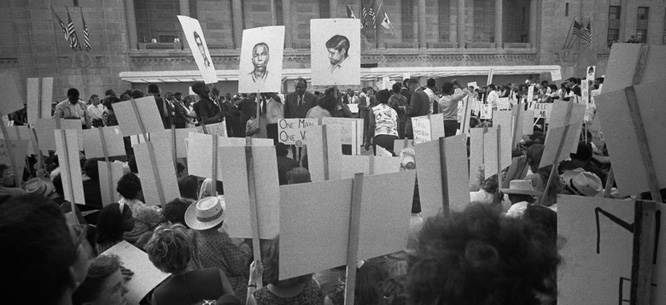
Mississippi Freedom Democratic Party supporters, 1964 (Library of Congress)
By Mike Miller
Dissent
May 23, 2014 - Community organizers and those who write about them have a bad habit of exaggerating the divide between "organizations" and "movements." Building the kind of people power we need to slow, halt, and reverse present trends requires of various organizing camps that they break out of present silos and find common ground with those now considered rivals (keeping in mind the bottom line requirement that a rival has to deliver people, not just have good ideas).
In their article "Would Saul Alinsky Break His Own Rules?", Mark and Paul Engler take several important steps in this direction. The piece breaks new ground in an old debate and is worthy of wide circulation. At times, however, it risks reinforcing misconceptions that have long hindered efforts to build genuine people power.
Take the Englers' initial characterization of "Chicago-style community organizing," which they in turn quote from another recent, and important, article by David Moberg:
Don't talk ideology, just issues. No electoral politics. Build organizations, not movements. . . . Focus on neighborhoods and on concrete, winnable goals.
No question has been more perplexing, disruptive, and obscuring than a point disparagingly raised by many that "Alinsky doesn't have an ideology." Unfortunately, many practitioners of Chicago-style organizing had a distorted understanding of Alinsky on this point, lending credence to the Englers' formulations. Today's organizers, following Alinsky's lead, should not allow themselves to fall into the same trap.
In a time of movement, organizing is like swimming with the river's current. In a time of political quiescence, however, organizing requires going against the current; it demands tough assessments of what is doable in the given context and attention to quick, nuts-and-bolts victories with visible results that help overcome pessimistic views of the efficacy of collective action. But Alinsky's worldview was hardly circumscribed by such short-term efforts. Even in the quiet times of the 1950s, he situated his work within the broad moral framework of the Judeo-Christian tradition and the democratic principles of the Declaration of Independence. His thinking was rooted in an American, small "d" radical democratic, populist understanding of the world....(Click title for more)
|
National Forum on Police Crimes Held in Chicago

Calls for Civilian Police Accountability Councils
By Pat Fry
ccds-discussion.org
In response to a national epidemic of police and vigilante killings, a two day "National Forum on Police Crimes" took place in Chicago, May 16-17. With some 250 people attending, the Forum called for legislation establishing a Civilian Police Accountability Council (CPAC) in Chicago and elsewhere.
The Forum was organized by the Chicago branch of the National Alliance Against Racist and Political Repression on the occasion of the organization's 41st anniversary. Founded in May 1973, the NAARPR developed out of the national and international campaign to free Angela Davis from a racist and politically-motivated frame-up. Over the years, numerous celebrated cases were won through the organizing efforts of the NAARPR including on behalf of the Rev. Ben Chavis, Joan Little, the Wilmington 10, and the Charlotte 3.
Concluding the two day Forum, a public rally with Angela Davis was held at the Trinity United Church of Christ. In her address, Davis said mass incarceration and police killings stem from "structural and systemic racism rooted in the failure to fully abolish slavery." Global capital expansion and its pursuit of profit, she said, fuel the prison-industrial complex. While money is spent on building prisons for profit, public education and affordable housing deteriorates, she said. Davis called for the abolition of prisons, disarming of police and freedom for all political prisoners held in U.S. jails from Mumia Abu-Jamal and Leonard Peltier to Chelsea Manning and the Cuba Five....(Click title for more)
|

By Katherine Bourzac
San Francisco Public Press
May 27, 2014 - Depletion of groundwater in the San Joaquin Valley is having wide-ranging effects not just on the agricultural industry and the environment, but also on the very earth beneath our feet. Massive changes in groundwater levels in the southern Central Valley are changing the stresses on the San Andreas Fault, according to research published today.
Researchers have known for some time that human activity can be linked to localized seismic effects. In particular, much of the debate about fracking in California in the past few years has centered on evidence that the process of injecting large volumes of liquid underground can lubricate fault lines and increase local earthquake risk.
Now geophysicists in Washington, California and Nevada have gathered evidence that human activity can have much farther-reaching seismic consequences.
This research was spurred by the observation that the southern Sierra Nevadas and the Coastal Ranges are rising by 1 to 3 millimeters a year. Geologists have been observing this movement, which they call uplift, using a network of GPS sensors planted along these mountain ranges. They've batted around theories about why it might be happening, with no clear answer.
"It looks like there's a big bullseye of uplift in the mountains surrounding the south Central Valley," said Colin Amos [3], a geologist at Western Washington University in Bellingham.
Ten years of satellite data show that groundwater use in the Central Valley is outpacing its replenishment, a trend that is intensifying in the current drought. Amos wondered if the two things might be connected. "What if uplift in the mountains is a response to sucking water out of the ground?" Amos said.
Amos and his collaborators found something that goes deeper than that - something that could look to a paranoid environmentalist like a grand unified theory of California problems: drought, water use, and earthquake risk. "We found a link between what humans are doing on the ground and the rate of earthquakes," Amos said. His data and model are published yesterday [4] in the international scientific journal Nature [5]....(Click title for more)
|
Donald Sutherland and William Fichtner lead a fine ensemble in dramatic American-written, Franco-German series, shot mostly in the Czech Republic.
By Alan Waldman
The Rag Blog
May 19, 2014 - [In his weekly column, Alan Waldman reviews some of his favorite films and TV series that readers may have missed, including TV dramas, mysteries, and comedies from Canada, England, Ireland, Australia, and Scotland. Most are available on DVD and/or Netflix, and some episodes are on YouTube.]
Crossing Lines is an English-language French/German international crime series shot in Czechoslovakia. In 2013, the first series of 10 episodes aired in Turkey, Croatia, India, Iceland, Poland, Japan, Sweden, Canada, Belgium, Italy, Hungary, UK, Germany, France, and in the U.S. as a Summer 2013 show on NBC. All episodes are on Netflix and Netflix Instant streaming. Here is one.
It has been renewed for 12 episodes on French channel TF-1 and Season 2 is due for delivery in other markets in the fourth quarter of 2014. It costs $3 million to produce an episode.
This action-packed global drama follows the adventures of the fictional International Criminal Court's police force pursuing cross-border crimes in exotic European locales. The team is headed by Marc Lavoine, playing a French police officer who is simultaneously seeking revenge on the Russian who murdered his son. William Fichtner is a wounded New York cop out to get the child white slaver who injured him.
Waldman's film and TV treasures you may have missed
Approval of all missions comes from the Court's Donald Sutherland. Other actors on the team are Tom Wlaschiha (as a German tech specialist), Richard Flood (as a Northern Irish weapons and tactical specialist), Gabriella Pession (an anti-mafia covert specialist from Italy) and Moon Dailly (as a French border cop). Added to the team for season two is Lara Rossi as a Dutch police officer.
Crossing Lines was created by Rola Bauer (five nominations for works including Pillars of the Earth and World Without End) and Edward Allen Bernero (who wrote five episodes of this series, won the Humanitas prize for Third Watch and also produced and wrote for Criminal Minds).
The series' locations and scenery are refreshing and beautiful. The casting is excellent. There are multiple plots going on, and high tension is constantly maintained....(Click title for more)
|
|
 Author: Robin Small Author: Robin Small
Karl Marx: The
Revolutionary as Educator
Springer, New York, 2013.
85pp., £44.99
Reviewed by Patrick Ainley
This book meets a need illustrated by a recent poster advertising a meeting for students at the London University Institute of Education that asked 'Who was Karl Marx?'
Such is the repetitive diet of Foucauldianism, augmented by the latest academic fashion for Deleuze and Guattari, that even postgraduate students of education are unaware that Marx was, as this book begins by asserting, 'an important educational thinker'.
Although Marx wrote before the modern state school system was established, Small states 'He is the greatest theorist of the society that gave rise to schools as we know them - and this is the society we still live in' (1). As he adds, Marx wrote for people who needed to find out what was wrong with the society they lived in, and how to change it for the better, and so he was also an educator. More importantly, 'Marx is an educator for us. He challenges us to develop our capacity to think critically about our own society' (2). This is the seminal Marx presented in this book.
Robin Small, a philosopher of education at Auckland University who has previously written Marx and Education (Ashgate, 2005), is well qualified to introduce new readers to Marx's revolutionary education in the concise form intended by Springer's series on 'Key Thinkers in Education', edited by Paul Gibbs, in which each chapter is separately downloadable, although the overall price - in virtual form or hard covers - is exorbitant. Hopefully, however, the book will make its way into libraries, because it is an introduction to Marx's life as well as to his thought. So Small begins with Marx's own education at the Trier Gymnasium, quoting Marx's prize-winning essay `Thoughts of a Youth on Choosing a Vocation', which insists 'worth can be assured only by a profession in which we are not servile tools, but in which we act independently in our own sphere' (5). Then, in Bonn and Berlin Universities, Small introduces the ideas of Bauer, Feuerbach and Stirner, which influenced Dr Marx before 'the theoretical mind, once liberated in itself, turns into practical energy' (quoted 9) in the form of 'Marx as Journalist'....(Click title for more)
|
Greet Freedom Summer's 50th With a Red Resolution...
Become a CCDS member today!
 The time is long past for 'Lone Rangers'. Being a socialist by your self is no fun and doesn't help much. Join CCDS today--$36 regular, $48 household and $18 youth. The time is long past for 'Lone Rangers'. Being a socialist by your self is no fun and doesn't help much. Join CCDS today--$36 regular, $48 household and $18 youth.
Better yet, beome a sustainer at $20 per month, and we'll send you a copy of Jack O'Dell's new book, 'Climbing Jacobs Ladder,' drawing on the lessons of the movement in the South in the 1950s and 1960s.
Solidarity, Carl Davidson, CCDS
|
|
|